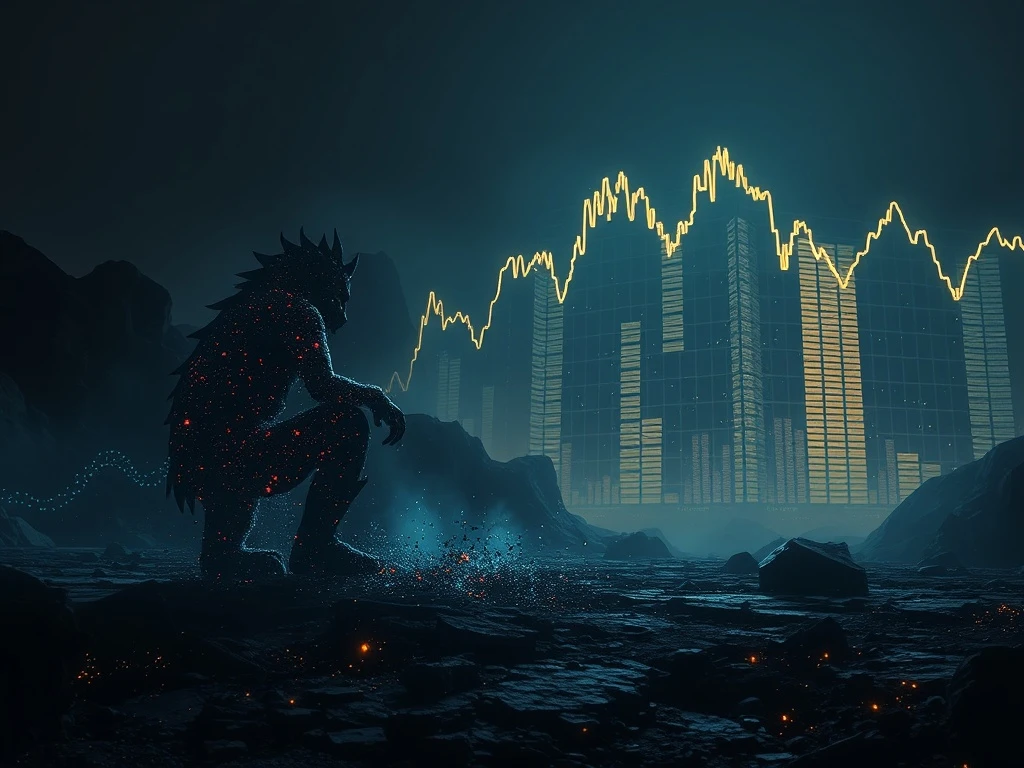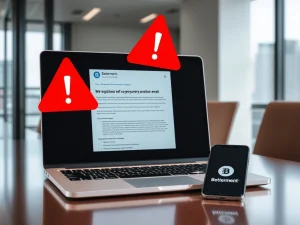Shocking Shutdown: Blockchain Game Tokyo Beast Collapses After 45 Days, Raising Crucial Web3 Gaming Questions

The vibrant world of blockchain gaming just experienced a significant tremor. The highly anticipated blockchain game Tokyo Beast: Cyberpunk RPG, launched with much fanfare on Immutable zkEVM, has announced its abrupt shutdown, merely 45 days after going live. This startling development leaves players and investors reeling, raising critical questions about the sustainability and future of Web3 gaming as a whole.
The Abrupt End of Tokyo Beast: A Web3 Gaming Cautionary Tale
On August 24, 2025, the curtain will fall on Tokyo Beast, a game that promised to merge immersive cyberpunk storytelling with cutting-edge blockchain technology. Naoki Motohashi, the project’s producer, cited the familiar culprits: exorbitant operational costs coupled with anemic revenue generation. This immediate closure underscores a recurring challenge within the nascent Web3 gaming sector – the struggle to translate ambitious technical visions into viable, long-term business models.
Players who invested in the game’s unique NFT-based characters and in-game assets are promised refunds in USDC, though the specifics of this process remain largely undisclosed, adding another layer of uncertainty to an already volatile situation. This rapid decline serves as a stark reminder of the inherent risks and the urgent need for more robust economic frameworks in decentralized gaming.
Decoding the Play-to-Earn Challenges: Why Games Struggle
The demise of Tokyo Beast isn’t an isolated incident; it echoes a broader narrative playing out across the industry. Many NFT games and play-to-earn (P2E) models have grappled with the fundamental challenge of balancing innovation with profitability. Why do these projects, despite leveraging decentralized infrastructure and digital asset economies, often fail to generate sufficient user engagement or revenue to cover their extensive operational expenses?
Several factors contribute to these persistent play-to-earn challenges:
- High Development & Maintenance Costs: Building and maintaining a blockchain game involves significant investment in smart contract development, server infrastructure, security audits, and ongoing game content creation. These costs often far outstrip initial funding, especially for complex RPGs.
- Unsustainable Tokenomics: Many early P2E models relied heavily on inflationary token rewards to attract players, leading to rapid depreciation of in-game currencies once new player growth slowed. This makes the ‘earn’ part of P2E unsustainable.
- Lack of Core Gameplay Appeal: A common critique is that many blockchain games prioritize speculative earning potential over engaging gameplay. If the game isn’t fun to play, users won’t stick around, regardless of potential financial incentives.
- Reliance on Speculative Investment: The sector’s reliance on new capital infusion, often driven by speculative interest in crypto assets, creates a fragile ecosystem. When market sentiment shifts, user engagement and investment can quickly evaporate, leaving projects in a precarious financial state.
- User Acquisition & Retention: Attracting and retaining a large, active player base is crucial for any game, but even more so for those relying on network effects for their economy. High barriers to entry (e.g., needing to buy NFTs upfront) can deter mainstream gamers.
The Perilous Path for NFT Games: Asset Liquidity and Investor Risk
For those who dove into the world of Tokyo Beast by acquiring its unique NFT games assets and in-game tokens, the shutdown raises immediate and serious concerns about the liquidity and long-term value of their digital investments. Unlike traditional gaming assets, which might simply become defunct but don’t represent a direct financial investment in the same way, NFTs carry a different weight. When a blockchain project collapses, the ecosystem supporting these digital assets vanishes, often rendering them worthless.
This situation highlights a critical flaw in many current NFT games: the absence of robust contingency planning. Traditional games, even when facing financial difficulties, often transition to free-to-play models, allow community-driven maintenance, or offer clear paths for players to retain their in-game progress. Tokyo Beast, however, offered no such mechanisms for asset preservation or buyback programs beyond the initial USDC refund promise. This emphasizes the significant risks associated with projects that prioritize the speculative investment aspect of NFTs over genuine, long-term player engagement and sustainable asset utility. Investors are left to grapple with the reality that their digital property is only as valuable as the ecosystem it inhabits.
Beyond Tokyo Beast: What’s Next for the Blockchain Game Ecosystem?
While the abrupt end of Tokyo Beast is undoubtedly a setback, it’s crucial to understand that it doesn’t necessarily signal the end of the broader blockchain game industry. The TOKYO GAMES ecosystem, under which Tokyo Beast operated, reportedly remains active, continuing to support other projects and developmental initiatives. This distinction is vital; it underscores the importance of diversification within blockchain ventures, where the failure of an individual project, while regrettable, does not automatically doom the entire framework.
However, the Tokyo Beast case serves as an invaluable, albeit painful, cautionary study for both developers and investors navigating the complex intersection of gaming and decentralized finance. Moving forward, the industry must focus on:
- Sustainable Revenue Models: Beyond initial NFT sales and token speculation, projects need diverse and robust revenue streams, perhaps incorporating subscriptions, in-game purchases for cosmetics, or truly innovative P2E mechanics that don’t rely on constant new user acquisition.
- Transparent Operational Strategies: Clear communication about development progress, financial health, and contingency plans can build greater trust within the community.
- Community-Centric Governance: Empowering players with a voice in the game’s direction can foster stronger loyalty and ensure the game evolves in ways that resonate with its user base.
- Focus on Core Gameplay: Ultimately, a blockchain game must first and foremost be a good game. Engaging mechanics, compelling narratives, and polished experiences will drive long-term retention far more effectively than speculative returns.
The lessons from Tokyo Beast are clear: the future of Web3 gaming hinges on moving beyond hype and speculation towards building genuinely fun, sustainable, and player-centric experiences.
The rapid rise and fall of Tokyo Beast serve as a potent reminder of the volatility and inherent risks within the burgeoning blockchain gaming sector. While the promise of player ownership and decentralized economies remains compelling, this incident highlights the critical need for projects to prioritize sustainable business models, robust gameplay, and transparent communication over speculative hype. For the industry to truly flourish, it must learn from these painful lessons, building foundations that ensure longevity, foster genuine engagement, and protect the investments of its dedicated community members.
Frequently Asked Questions (FAQs)
Q1: What caused the shutdown of Tokyo Beast?
A1: Tokyo Beast shut down primarily due to high operational costs and insufficient revenue generation. The game struggled to attract and retain enough players or generate enough income to offset its significant development and maintenance expenses.
Q2: Will players who invested in Tokyo Beast NFTs and in-game assets receive refunds?
A2: Yes, the project’s producer, Naoki Motohashi, stated that players who invested in the game’s NFT-based characters and in-game assets would receive refunds in USDC. However, specific details about the refund process or timelines were not disclosed at the time of the announcement.
Q3: Does the shutdown of Tokyo Beast indicate a failure of the entire blockchain gaming industry?
A3: Not necessarily. While the shutdown is a significant setback and highlights ongoing challenges, it doesn’t mean the entire blockchain gaming industry is doomed. It serves as a cautionary tale, emphasizing the need for projects to adopt more sustainable business models, focus on core gameplay, and ensure transparent operations. The broader TOKYO GAMES ecosystem remains active.
Q4: What are the main challenges facing blockchain games and Play-to-Earn (P2E) models today?
A4: Key challenges include high development and maintenance costs, unsustainable tokenomics that rely on constant new player growth, a lack of compelling core gameplay experiences, over-reliance on speculative investment rather than genuine player engagement, and difficulties in user acquisition and retention due to high barriers to entry.
Q5: How can future blockchain games avoid similar fates to Tokyo Beast?
A5: Future blockchain games need to focus on developing sustainable revenue models beyond initial NFT sales, prioritizing engaging core gameplay, implementing transparent operational strategies, fostering community-centric governance, and ensuring robust contingency plans for digital assets in case of project failure.









